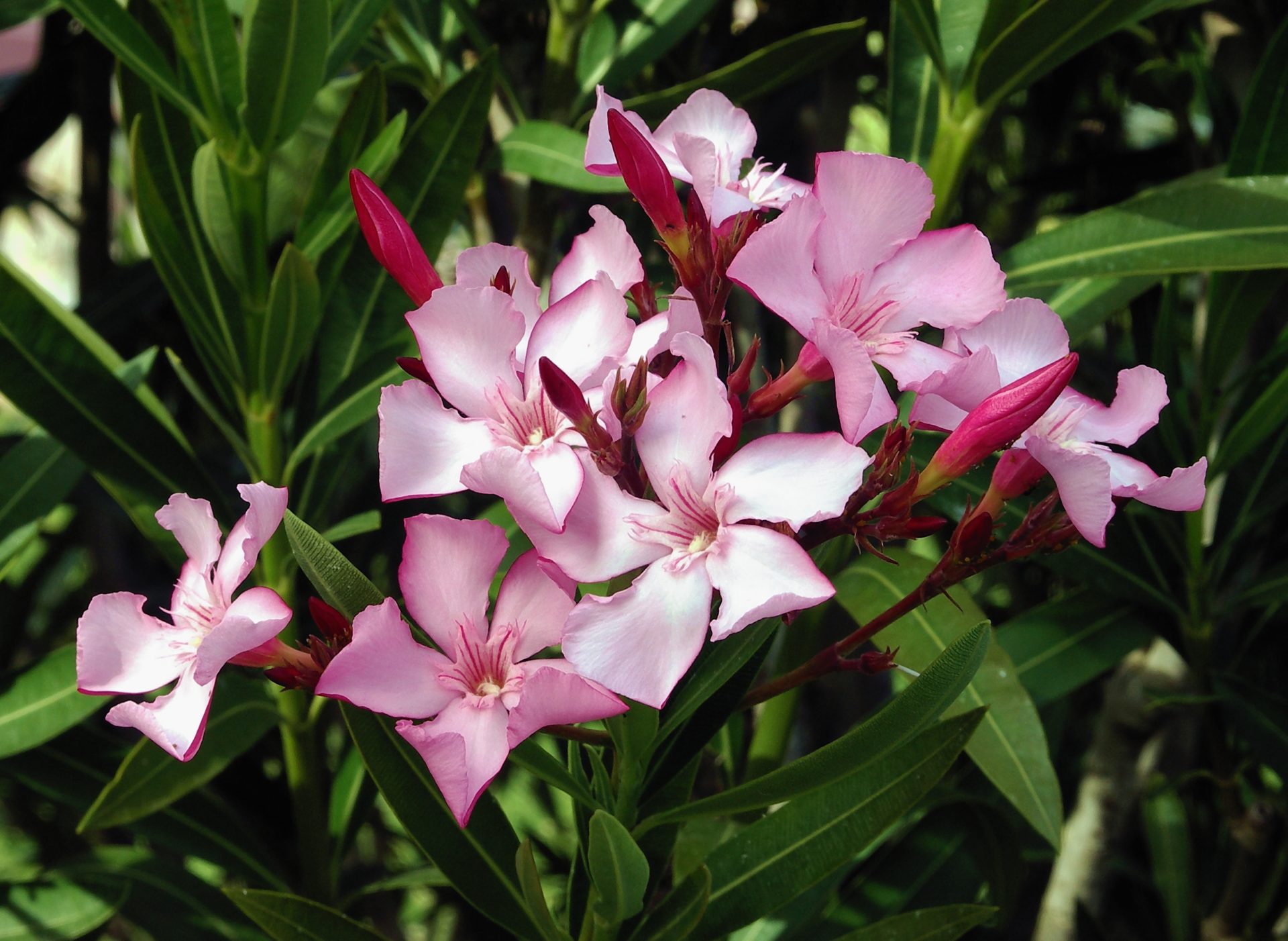Although this is quite askew from our usual pain-related topics, it is being posted more as a public service out of safety concerns for our readers. We’ve all seen quite a paradigm shift over the last several weeks, the likes of which I never thought I’d see. Big Pharma seems to be protecting the public against government with regard to vaccine development – who would’ve thought!
Here to share our latest blog are PharmD Candidate Lauren Bertocciand and Dr. Himayapsill Batista Quevedo.
A recent Tweet from Dr. Stefan Kertesz (@StefanKertesz), physician and professor of preventative medicine and health behavior at the University of Alabama at Birmingham School of Medicine, triggered a deep dive into the newest alleged cure all for COVID-19, oleander.
Nerium oleander is a shrub with pretty pink flowers found in temperate and sub-tropical climates. It contains compounds that can be cardiotoxic and even fatal, similar to digitalis derived from foxglove. Although the foxglove plant produces pretty purple flowers and for many years the digoxin derivative has saved lives, it too has a narrow therapeutic index and has caused many thousands of deaths over decades. An example, in 2017 a woman mistakenly drank a cup of foxglove tea instead of comfrey tea, which resulted in seven days of suffering, and ultimately death.1 Oleander has been touted for cardiac conditions, asthma, epilepsy, cancer, dysmenorrhea, leprosy, malaria, ringworm, indigestion, venereal disease, and as an abortifacient and topically for ulcers, skin eruptions, and warts. Notwithstanding, there are no evidence-based studies that promote its use for any condition, not the least of which is COVID-19, aka severe acute respiratory syndrome coronavirus 2 (SARSCoV-2). Reports of deaths following ingestion of oleander resulting from heart dysrhythmias and cardiac arrest have occurred.2
Most recently, oleander has been floated as an alleged treatment for COVID-19 by Dr. Ben Carson, US Secretary of Housing and Urban Development, and Mike Lindell, CEO of MyPillow, Inc. Mike Lindell is an investor in Phoenix Biotechnology and Ben Carson, his personal friend, is a retired neurosurgeon who has been serving in his current position since March 2017, although his only qualification to oversee urban development, according to a close friend and adviser, seems to be “his life growing up in subsidized housing.”3
Phoenix Biotechnology, Inc. developed Anvirzel, a Nerium oleander extract. Anvirzel was undergoing a Phase I clinical trial in 2012 to investigate the maximum tolerated dose of sublingual Anvirzel in combination with chemotherapy for the treatment of advanced non-small cell lung cancer, however, for unknown reasons this trial was stopped before enrolling its first participant.4 Another two trials attempted to investigate Oleander, however one was withdrawn5 and the other one has unknown status.6 It was last known to be active and not recruiting, but it has passed the completion date and the status has be unverifiable for over 2 years.6 Bottom line here is that there are currently no published clinical trials demonstrating the safety of Oleander in healthy adults. For Mike Lindell to make such an absurd recommendation reminds us of the recent post here regarding the promotion of hydroxychloroquine by two non-medically trained government officials, Economist Peter Navarro and President Donald J, Trump. But in this particular case, where Dr. Ben Carson is advocating for oleander, it rises to the level of medical misconduct, as he is still listed as holding a license to practice medicine in the State of Maryland (License Number: D29431 BENJAMIN SOLOMON CARSON).
Nerium oleander is a poisonous plant that inhibits sodium-potassium adenosine triphosphatase (Na,K-ATPase), similarly to digoxin. It increases intracellular sodium leading to increased intracellular calcium concentration resulting in slowing electrical conduction in the heart, thus slowing down heart rate. Nerium oleander can be toxic and fatal due to hyperkalemia and loss of electrical excitability within cardiac tissue.7 Digoxin is a medication with a very narrow therapeutic index, meaning the slightest variation in blood concentration can easily result in toxic effects to the heart. Na, K-ATPase plays an integral role in electrolyte homeostasis and cell signaling pathways. Viruses infect cells by taking over cellular functions and using them to synthesize their own proteins. Coronaviruses have been shown in animal studies to be repressed when Na,K-ATPase is inhibited by cardiac glycosides, such as digoxin, which results in impaired viral entry into cells. Src signaling inhibition resulting from Na,K-ATPase inhibition has also been shown to be involved in coronavirus inhibition.8 A recent study in monkeys showed that in Vero cells infected with SARS-CoV-2, oleandrin has potent prophylactic and therapeutic antiviral effects.9
Evidence for use of Nerium oleander in the fight against COVID-19 should be taken with a grain of salt (pun intended). It is understandable that with the life-altering severity of the COVID-19 pandemic, people want to quickly find an effective treatment. Nevertheless, it is irresponsible to even suggest that oleandrin be used in human subjects without proper studies, dosing, and quality control among products. Currently, there is one active clinical trial to assess safety and efficacy of Nerium oleander in COVID-19 positive patients, but it is far from becoming a viable option to cure patients of COVID-19.10 Nerium oleander is a cardiac glycoside and has been shown to have toxicity similar to digoxin including malignant dysrhythmias and hyperkalemia. This compound is also used as an agent for suicide, especially in Asia. A 2013 report of 65 yellow oleander poisonings in Eastern Sri Lanka revealed that almost all cases were suicide attempts.11 Use of this substance requires further testing and should not be noted as a treatment for COVID-19, especially by a US Cabinet member who is a licensed medical doctor, due to the possibly fatal toxicities. And for Mike Lindell to recommend this, one word describes that, #cockwomble. For now, it seems that there may be a financial interest by Phoenix Biotechnology, Inc. and its investors to push Nerium oleander as the answer to COVID-19. Remember, just because a product is “natural” does not mean it is safe!
Note that the FDA issued a letter dated August 14, 2020 rejecting the submission from Phoenix Biotechnology Inc. to market oleandrin as a dietary supplement. Moreover, the FDA noted significant safety concerns regarding Oleandrin use as the studies performed where in patients with advanced cancer and the results from these studies cannot establish efficacy or safety in its intended population of “normal healthy patients.”12 Despite the posting of this letter, MyPillow CEO continues to advocate for this dangerous supplement and continues to spew false narratives on mainstream media to American citizens on national television. But aligned with his advertisements, if you do take oleandrin, you certainly may experience a sound sleep – the last sleep of of your life.
As usual, we enthusiastically welcome all civil comments!
Authors:
Above, Lauren Bertocci is a PharmD candidate in the class of 2021 at Western New England University College of Pharmacy and Health Sciences. She received her B.S. in Psychology from Stony Brook University in 2017. Currently, she is completing a pharmacy rotation with the interdisciplinary pain management clinic at Albany Stratton VA Medical Center, Albany, NY.
Above, Dr. Himayapsill Batista Quevedo is currently completing a PGY-2 Pain and Palliative Care Pharmacy Residency at the Stratton VA Medical Center, Albany, NY. Dr. Batista received her PharmD from Wilkes University Nesbitt School of Pharmacy Wilkes-Barre, PA and completed a PGY-1 residency at Corporal Michael J. Crescenz VA Medical Center, Philadelphia, PA.
References:
- Wu I, Yu J, Lin C, et al. Fatal cardiac glycoside poisoning due to mistaking foxglove for comfrey. Clin Toxicol (Phila). 2017 Aug;55(7):670-3.
- In: Natural Medicines [database on the Internet]. Stockton (CA): Therapeutic Research Center; 2020 [updated 2020 Aug 27, cited 2020 Aug 30].
- Pesce NL. 4 facts about oleandrin, an unproven coronavirus treatment reportedly pitched to Trump [Internet]. New York. MarketWatch, Inc; 2020 Aug 18 [cited 2020 Aug 30]. Available from: https://www.marketwatch.com/story/4-facts-about-oleandrin-an-unproven-coronavirus-treatment-reportedly-pitched-to-trump-2020-08-17.
- Lee RT. Sublingual anvirzel in advance non-small cell lung cancer (NSCLC). 2012 Mar 23 [last updated 2015 Jun 8; cited 2020 Aug 30]. In: ClinicalTrials.gov [Internet]. Bethesda (MD): U.S. National Library of Medicine. Available from: https://clinicaltrials.gov/ct2/show/NCT01562301.
- Greenway F. A blinded comparison trial of two topical creams to reduce thigh girth and to smooth thigh skin in women (thighcream). 2013 Aug 12 [last updated 2015 Dec 18; cited 2020 Sep 4]. In: ClinicalTrials.gov [Internet]. Bethesda (MD): U.S. National Library of Medicine. Available from: https://clinicaltrials.gov/ct2/show/NCT01920841.
- Berlin J. Efficacy and safety study of PBI-05204 in patients with stage IV metastatic pancreatic adenocarcinoma. 2015 Jan 1 [last updated 2016 Sep 29; cited 2020 Sep 4]. In: ClinicalTrials.gov [Internet]. Bethesda (MD): U.S. National Library of Medicine. Available from: https://clinicaltrials.gov/ct2/show/NCT02329717.
- Plants-cardiac glycosides. In: POISONDEX Managements [database on the Internet]. Greenwood Village (CO): IBM Corporation; 2020 [updated 2019 Dec 6; cited 2020 Sep 1].
- Amarelle L, Lecuona E. The antiviral effects of Na,K-ATPase inhibition: a minireview. Int J Mol Sci. 2018 Jul 24;19(8)2154.
- Plante KS, Plante JA, Fernandez D, et al. Prophylactic and therapeutic inhibition in vitro SARS-CoV-2 replication by oleandrin. bioRxiv. 2020 Jul 15. Preprint
- Dunn K. Impact Nerium oleander on symptoms and mortality: a feasibility study. 2020 Jul 24 [last updated 2020 Jul 24; cited 2020 Sep 4]. In ClinicalTrials.gov [Internet]. Bethesda (MD): U.S. National Library of Medicine. Available from: https://clinicaltrials.gov/ct2/show/NCT04486144
- Pirasath S, Arulnithy K. Yellow oleander poisoning in eastern province: an analysis of admission and outcome. Indian J Med Sci. 2013 Aug;67(7-8):178-83.
- Food and Drug Administration. NDI 1157 Oleandrin from Phoenix Biotechnology, Inc. [cited 2020 Sep 4]. Available from: https://beta.regulations.gov/document/FDA-2020-S-0023-0068




Hog wash from politicians as usual.